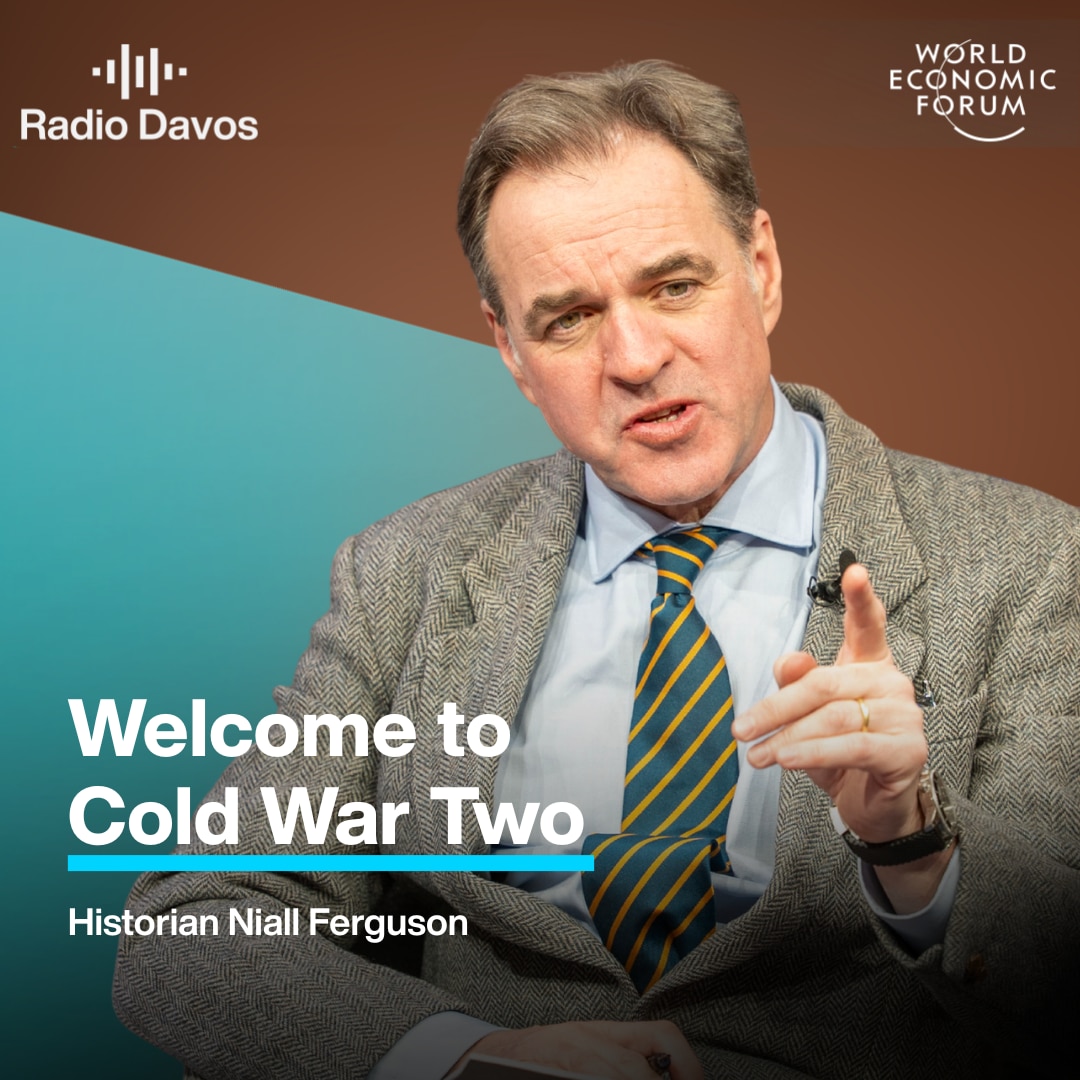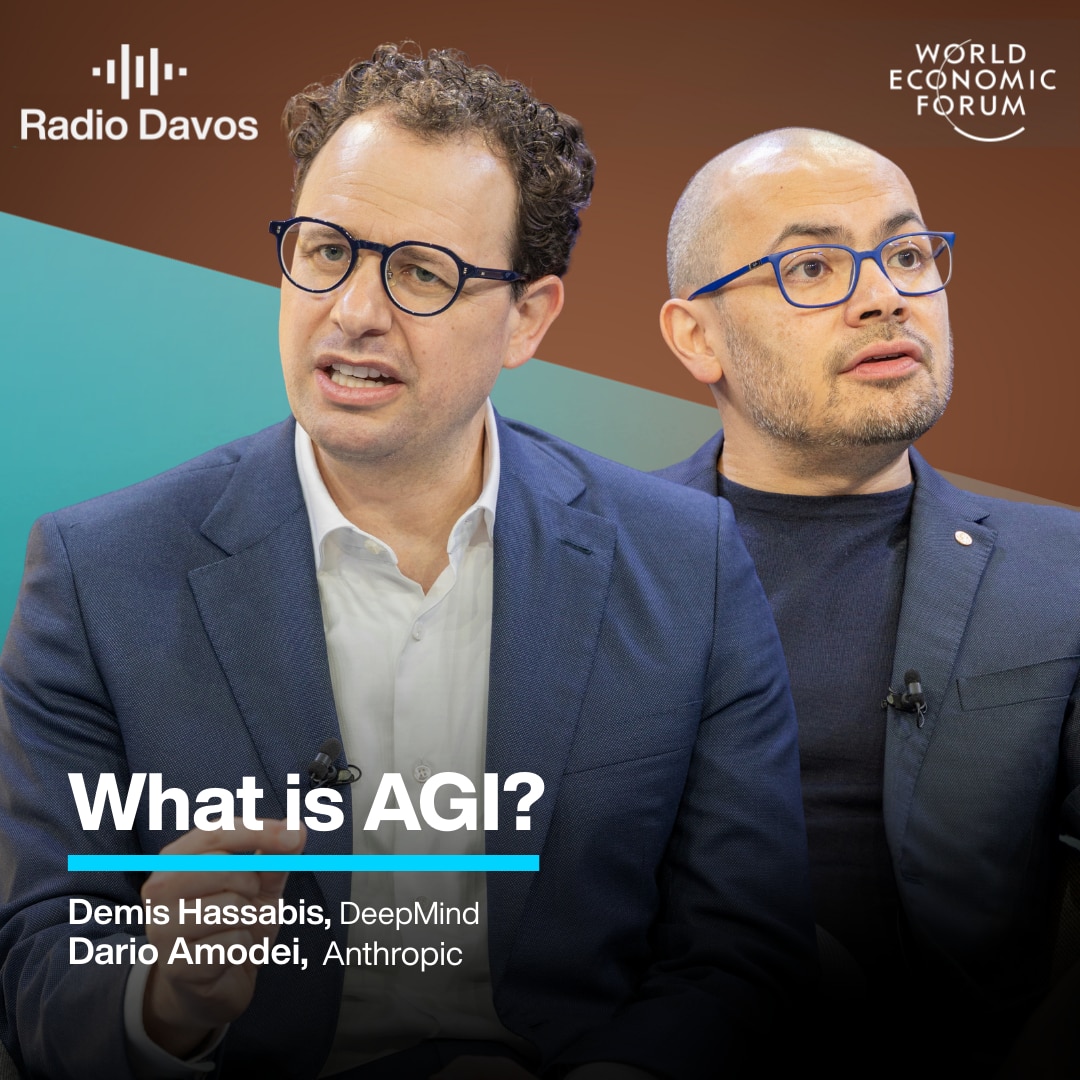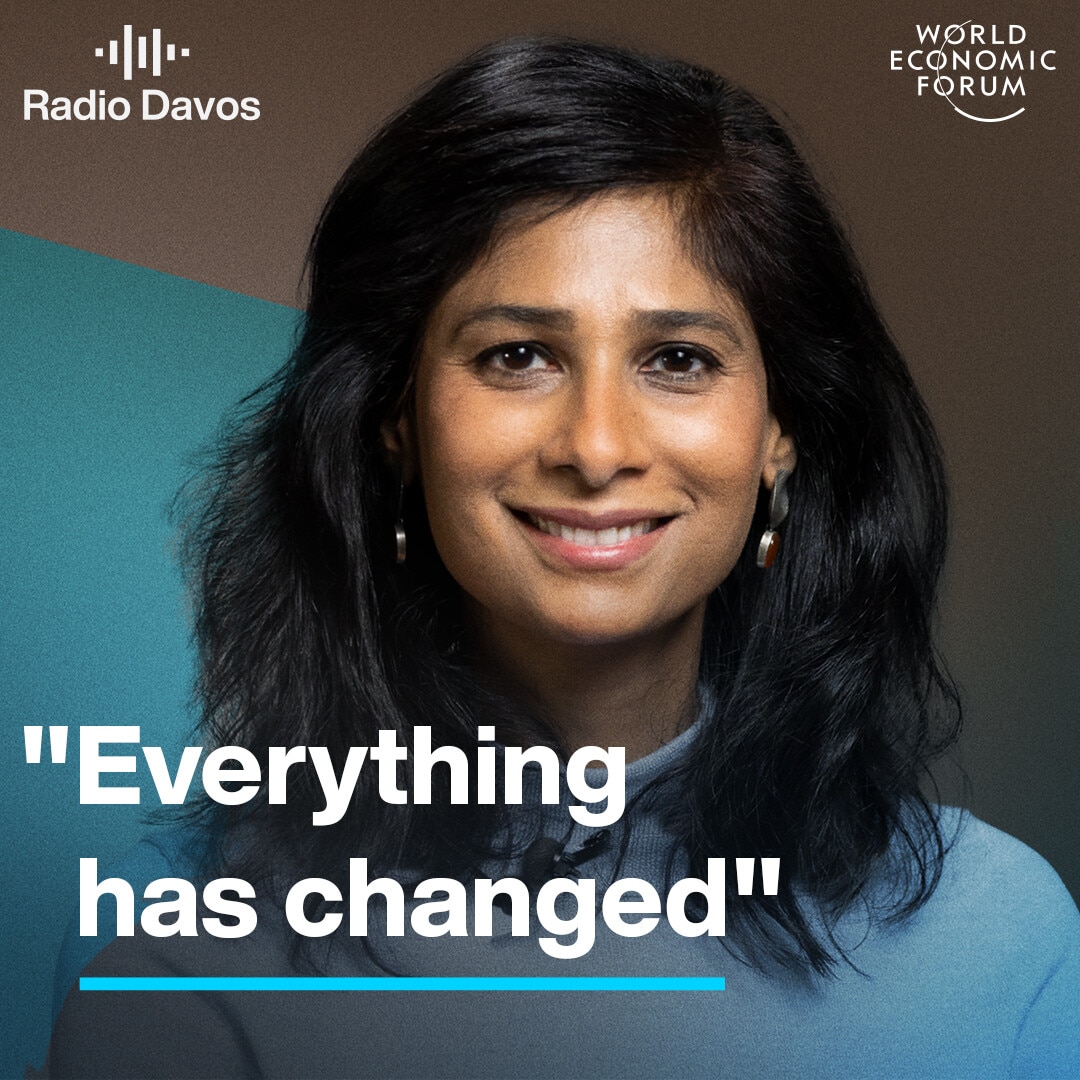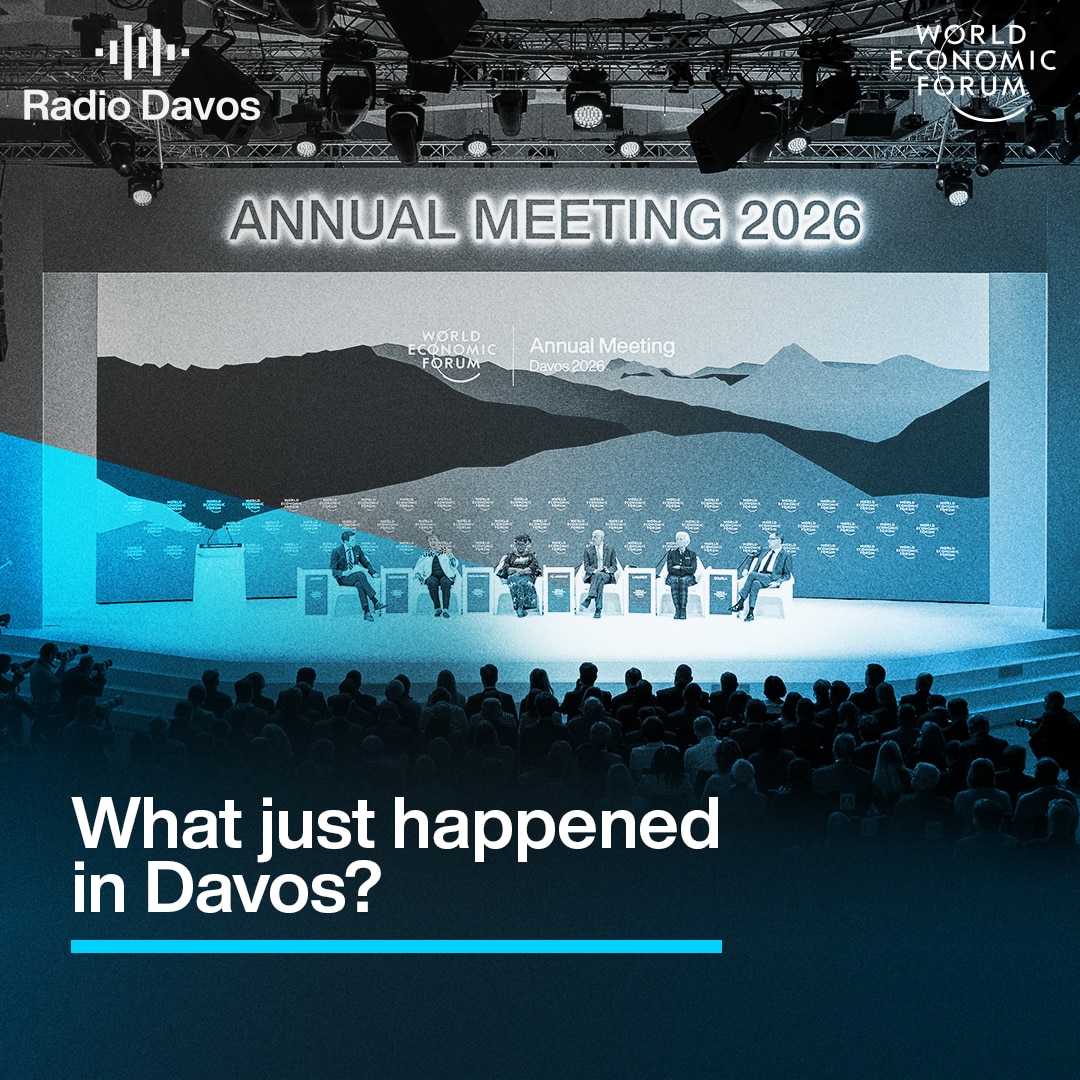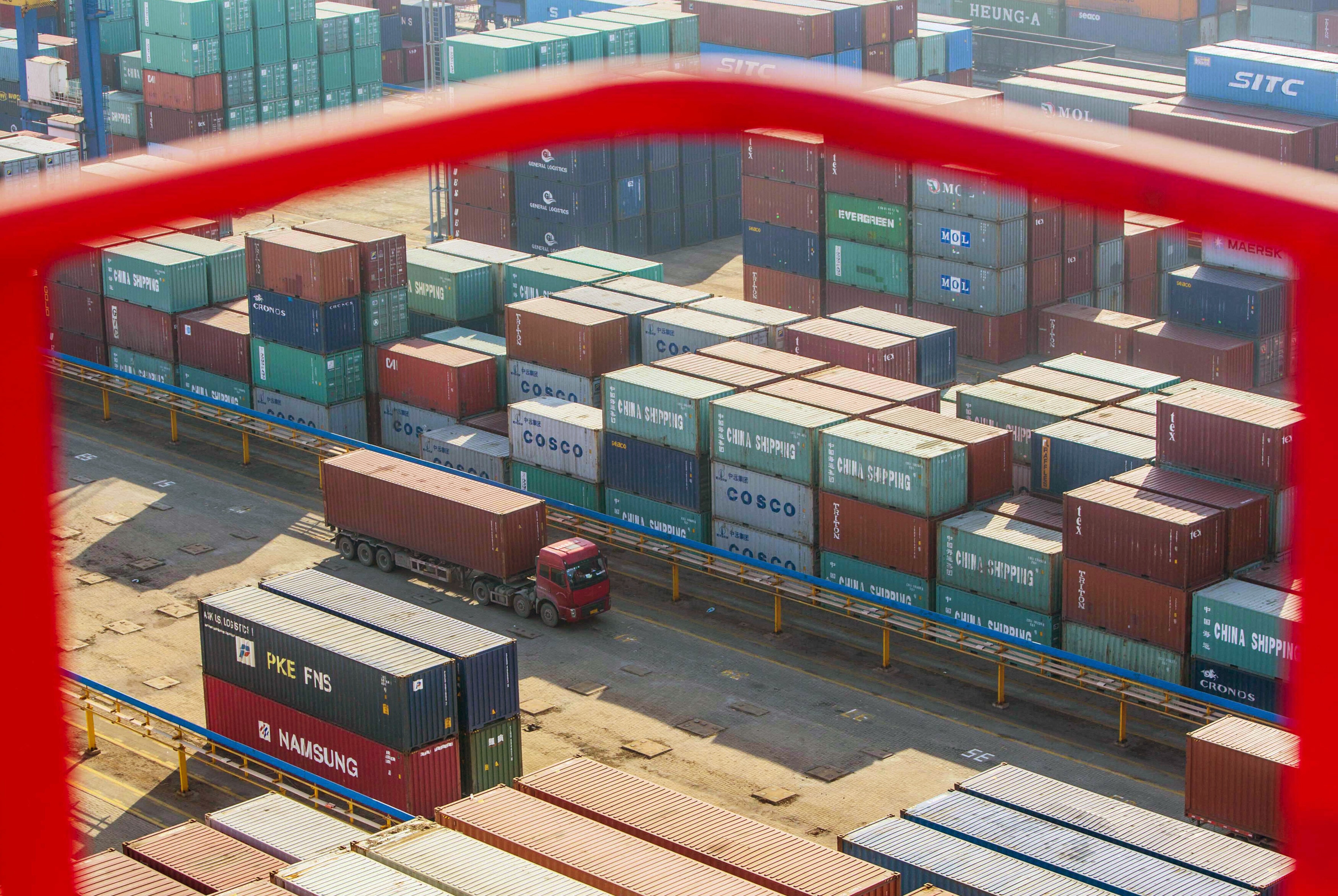Globalization is in transition - not retreat, says this analyst of global trade
Podcast transcript
Simon Evenett, founder, St. Gallen Endowment for Prosperity Through Trade: I see globalization essentially being reoriented. I don't see retrenchment. I see can-do businesses trying to find ways to make globalization work better and better for them, not retreat from it.
Robin Pomeroy, host, Radio Davos: Welcome to Radio Davos, the podcast from the World Economic Forum that looks at the biggest challenges and how we might solve them. This week, as the Forum convenes its big meeting in China, we’re looking at the state of gloabalization. Re-shoring friend-shoring, export bans, tariffs and sanctions - is global trade going into reverse, or simply into a new phase? And how should companies react?
Simon Evenett: We are seeing a big evolution in how companies are assessing these risks. Many companies are on a journey in this respect here, becoming more sophisticated about how they do this, how to cope with this ever changing world.
Robin Pomeroy: This analyst looks at the resurgence of ‘industrial policy’, as governments intervene to help their domestic manufacturers - and considers what the unintended consequences might be.
Simon Evenett: When governments develop their interventions in industrial policy, they should have in mind very much what objectives they're trying to accomplish. Just saying I want to build an industry here or repatriate production or how much, can we translate as much of these objectives into quantifiable metrics so we know what success is.
Robin Pomeroy: Subscribe to Radio Davos wherever you get your podcasts, or visit wef.ch/podcasts where you will also find our sister programmes, Meet the Leader and Agenda Dialogues.
I’m Robin Pomeroy at the World Economic Forum, and with this look at the future of globalisation and of global trade.
Simon Evenett: The potential for making some very bad decisions is quite high.
Robin Pomeroy: This is Radio Davos
On 25-27 June, 2024, the World Economic Forum is convening its 15th Annual Meeting of the New Champions - the AMNC in Dalian, the city in China. It’s a chance for leaders from business, government, civil society, academia and beyond to meet, in Asia, to discuss some of the world’s most pressing issues.
This year’s edition of AMNC has as its theme 'Next Frontiers for Growth'. One of the factors that has spurred economic growth in many parts of the world over the last few decades has been globalisation. But with rising geopolitical tensions, and concerns about the downsides of globalisation to jobs or the environment, might we be seeing global trade go into reverse?
To get a clear picture of the state of global trade and where it might be going, we spoke to Simon Evenett, founder of Switzerland-based trade policy think tank the St. Gallen Endowment for Prosperity Through Trade. Simon is also a co-chair of the Forum’s Global Future Council on the Future of Trade and Investment and a contributor to a report called The Costs of Geopolitical Rivalry for Business: Ten Lessons for Better Policy Design.
He spoke to my colleague Spencer Feingold.
Spencer Feingold: Well, I'd like to begin by asking you about a white paper you wrote recently on the costs that geopolitical rivalries are having on businesses around the world. In the paper, you write that the case for free trade is under unprecedented pressure. Do you mind describing the various types of pressures that we are currently seeing impacting the global economy?
Simon Evenett: Pressure on globalisation, or at least the support for free markets, I think comes from three sources.
One, after the pandemic, there was a real concern that cross-border supply chains didn't work as well as they should do. Now, one can debate whether that's the case, but there's certainly some policymakers who no longer trust market forces as much as they used to.
A second source of pressure comes from the intensifying geopolitical rivalry between the United States and China, and their respective allies. This has created distrust and has made it more difficult to advance cooperation.
The third source of pressure comes from within our countries, as populations, especially in democracies, are increasingly divided over the merits of free trade, and this is largely a result of the fact that in some countries, living standards have been stagnant for less educated employees for a long time.
Spencer Feingold: So I'm also curious about how these pressures differ from past instances where free trade was being questioned. I'm thinking about the anti-WTO protests in the 1990s, for instance, or other anti-globalization movements in various corners of the world. Would you say that the pressures today are different from those in the past, and are they more severe today?
Simon Evenett: The pressures today on globalisation are much more severe than in the 1990s. They were very important then and then and back then they reflected the divisions within our societies which were beginning to emerge.
Now it's an order of magnitude different because we have major players in the trading system, such as the United States, who are no longer convinced that advancing free trade and opening markets is such a good idea. So that's one huge difference.
There's growing suspicions between players, between big countries. In the 90s, we didn't have such tensions between the US and China, and we definitely have them now.
And then, of course, we've had a sequence of shocks which have hit the world economy, the global financial crisis, the pandemic and so on and so on. And this has undermined, I think, people's confidence in the ability to be able to plan. And if you're trying to maximise the benefits of globalisation, you need to be able to make investments over years and years to come. And that's all been disrupted.
Spencer Feingold: And it also seems like many of these shocks are interconnected and in fact exacerbate each other. Recently, for instance, we've seen ships avoiding the Red sea due to due to conflict in the region. However, this increases emissions because the ships are now taking longer routes. Do you mind speaking to the interconnectedness of the pressures we're seeing today?
Simon Evenett: There are definitely knock-on effects and dominoes out there.
A great example is when we started seeing wheat being blockaded through the Red sea. This pushed up the price of wheat and other grains in many emerging markets, creating food insecurity problems and increasing the risk of social unrest and turmoil. That, in turn, often encourages political instability and potential for conflicts and invasions.
So this type of, knock-on effect from something, from food to other areas, has been well demonstrated in the past. And if I fear we'll have more of that coming up in the future.
Spencer Feingold: And for the white paper, you interviewed several executives about how they're responding to geopolitical tensions. Of course, these tensions are increasingly, broad and complex. So for your research, do you think that the private sector is aligned on even understanding these conflicts and how they relate to the global economy?
Simon Evenett: One of the most surprising things we found when we interviewed lots of executives was that they understand this word geopolitics in lots of different ways. So it's become a catchall term.
And for some it is indeed about rivalry between China and the US, for some it's about conflicts in different parts of the world. Others, it's it's about protectionism. There are lots of different ways of looking at this problem.
And I think one of the big takeaways from that is that when governments want to talk about geopolitics, they have to communicate very clearly which aspects they're referring to, because otherwise companies will misinterpret these signals. And that's likely to be a recipe for disappointment for all concerned.
Spencer Feingold: And I wonder if you could discuss in more detail how exactly the pressures on free trade are impacting businesses. Which part of companies are being affected and what does that risk should these pressures worsen?
Simon Evenett: So one of the things we did in the paper was to identify 12 different ways in which firms take advantage of globalisation, and that could be involving seeking out new revenue streams abroad, lowering your costs, reconfiguring how you organise yourself internally and how a firm finances and acquires resources.
All of those things can be jeopardised in different ways by geopolitics.
So you could be shut out of foreign markets because of a trade war. You could find the costs of your energy that you were buying from Russia suddenly surge, if you're a case of a German company. You could find that you're unable to hire Chinese scientific talent as much as you used to be able to. And you might find that you can't finance your company as well as in the past because you can't tap into foreign capital markets.
So all of these different ways are potentially at risk if geopolitical rivalry gets too far out of control.
Spencer Feingold: I also wonder how companies are responding to this type of volatility. We've seen headlines about companies shifting supply chains or even moving headquarters or factory locations. So what are you seeing with regards to how companies are taking action to respond to geopolitical pressures?
Simon Evenett: The response across different industries is very varied. So much depends on how much a company tapped into overseas markets to start with.
We're certainly seeing some companies moving production out of China, often maybe to Vietnam and Mexico. This is often linked to companies which are trying to supply the North American market.
We're also seeing other companies rethinking their innovation strategies, perhaps localising innovation for certain markets and or moving some sensitive innovation projects outside of geopolitical hotspots.
We're also seeing some firms trying to essentially liquidate and withdraw from certain key geopolitical hotspots.
The responses were quite diverse, but this reflects the fact that the commercial footprints of so many companies differ so much across sectors.
Spencer Feingold: So you mentioned that Vietnam and Mexico are becoming key players in global supply chains. Are you seeing other regions around the world, other economic zones that are perhaps emerging as key players?
Simon Evenett: The biggest attention has been given to Vietnam and to Mexico. And this seems to garner all the headlines. But when you look at the FDI data, you can actually see there are many other large emerging markets which are attracting lots of foreign investment, such as Brazil, parts of the Gulf region, some parts of Africa as well.
So I think factories are on the move. I wouldn't like to say that they're on the move to just 1 or 2 places, but of course the pressures to move production closer to customers are probably strongest in the North American region, and this is why Mexico gets so much attention.
Spencer Feingold: And what about companies who might want to open a factory in a different country, or open new stores somewhere else in the world? Are businesses today using different metrics or different assessment mechanisms to determine their geopolitical risk?
Simon Evenett: We are seeing a big evolution in how companies are assessing these risks. And again, many companies are on a journey in this respect here becoming more sophisticated about how they do this.
Perhaps at the less sophisticated end you have companies which view geopolitics as a compliance risk mainly to deal with sanctions. But I think that more and more companies realise that they need to figure out how they're going to enter markets, or rather, which markets to play and how they're going to enter, whether they're going to deploy lots of capital there, or maybe enter via franchising or some licensing model where they put less of their own capital at risk.
We're seeing quite sophisticated responses developing as companies figure out how to cope with this ever changing world.
Spencer Feingold: And you mentioned earlier that tension between the United States and China is a big threat to the global economy. It's quite interesting because this economic relationship has, of course, created a lot of growth throughout the world. So how are businesses dealing with the ongoing US-China tensions?
Simon Evenett: This is very much in flux. But I think what we've seen up until now is quite selective decoupling. That is in some very sensitive areas where certain technologies are at stake. Take semiconductors and the like. We are beginning to see commercial ties thinning between China and the West, but in many other areas, they're as thick as ever, if not growing.
And so it's quite a mixed picture that we're observing over time in terms of the relationship between these two behemoths.
I think the one thing that is on the horizon which worries me is that the characterisations of the Chinese economic model are so negative in some parts of the West that China's not being given any benefit of the doubt. And as a result, I think a lot of Chinese executives and officials aren't listening to the criticisms either. And the risk is that we develop a dialogue of the deaf. And both parties just start taking indiscriminate action against each other. That would be a scenario which I think we must do everything to try and avoid.
Spencer Feingold: So we're also seeing a resurgence of industrial policy by governments around the world who are trying to bolster domestic industries or shape economic competition with neighbours in countries elsewhere. I'm curious, what do you think governments should keep front of mind as they develop their industrial policies?
Simon Evenett: When governments develop their interventions in industrial policy, they should have in mind very much what objectives they're trying to accomplish. Just saying 'I want to build an industry here or repatriate production, or how much' - can we translate as much of these objectives into quantifiable metrics so we know what success is?
Secondly, governments should try and inject as much competition in their industrial policies as possible. So instead of just giving a grant to a company, say, $5 billion to produce some part of a semiconductor plant, why not have a competition between firms to see which one could put forward the best plan to do that? Now, of course, that depends on the number of firms in a particular sector. But injecting as much competition in here, I think, is likely to elicit better private sector offers to governments.
And lastly, we have to be very transparent about how the money is allocated. And then afterwards we have to learn how effective these different forms of industrial policy are, because some are going to be much more effective than others. And governments, after all, are accountable to their people for how they spend money. And if they can show that they are learning to improve industrial policy over time, populations might be more sympathetic putting up these large amounts of cash. If not, then I expect we'll have a backlash against industrial policy in the near future.
Spencer Feingold: And are you worried that geopolitical tensions might derail some industrial policies if governments take short sighted decisions?
Simon Evenett: Oh, absolutely. I mean, I think the potential for making some very bad decisions is is quite high. And in fact, we may already be seeing that in semiconductors, where every big economy seems to feel like they need to have some part of the semiconductor supply chain, if not the major production part. And this is a recipe, I think, down the road, for a massive glut in semiconductors and lower prices there. And then the companies will have to be bailed out again because they're no longer financially viable.
So this is one of these cycles and knock on effects that you mentioned earlier, which I think is brewing in the area of semiconductors.
Spencer Feingold: And what about the private sector? Of course businesses have agency and they're independent actors. So how can companies strengthen their understanding of geopolitical competition and geopolitical rivalries?
Simon Evenett: So the first thing is that, I mean, geopolitics has many dimensions to this. And we really outline that in the paper. And I think boards of companies now need to start taking a broader canvas of this. This is not just a US-China contest. There are different facets here.
So I think boards have to educate themselves on the different types of geopolitical risks. Then they have to figure out how to assess those geopolitical risks, which parts of their operations and strategy are going to be compromised.
And to turn this around, let's not be negative about this. There could well be opportunities as well, which, which are present.
And then also companies need to figure out what's their risk appetite. Some of the companies we spoke to have had looked at their operations in places like China and turn around and said that there is no way they could replicate them as efficiently elsewhere. And they were prepared to accept the additional risks associated with remaining in China.
And so that's a judgement. One may not necessarily agree with it. It might not be the right judgement, but it's one which requires taking a position on risk appetite as well.
So I think these are the areas and ways in which corporate political risk moves from being a compliance issue, a nuisance issue, to being central to strategy making of companies.
Spencer Feingold: And what about companies or business associations being directly involved in de-escalating geopolitical tensions? Do you see the private sector playing a role in lowering the temperature with regards to geopolitical rivalries?
Simon Evenett: Well, the private secto, I would argue, has a very strong interest in seeing such de-escalation.
So President Biden has called for what he calls a guardrails approach on competition between China and the United States. In that type of scenario, competition doesn't stop. But at least there's some expectations about how Beijing and Washington, D.C. would behave.
That type of environment might de-risk a lot of investments across the Pacific. And so I can see, business there having a strong interest in seeing that type of outcome.
We shouldn't forget that after the First World War, there was a group of executives who called themselves merchants for peace. And out of that came the International Chamber of Commerce, as we know. And this, the ICC, has played an important part in trying to tamp down tensions and increase mutual understanding. And I think that's something which we should all be supporting.
Spencer Feingold: So it's also well agreed upon that free trade and globalisation has brought tremendous prosperity to the world. But there are people with honest critiques about the system in good faith, actors who have been calling for perhaps a rethinking of global trade. So how did you think the system of free and global trade could be improved upon today?
Simon Evenett: If I may, I can go back to an episode earlier in my career where I was a junior World Bank official, and at the time, we were writing reports on the future of globalisation at the end of the last century, where we're saying, look, in order to get the most out of globalisation, you need to have strong domestic institutions to help displaced workers retrain and to restore their living standards, to get their careers back on track.
If we're honest with ourselves, very few countries have those institutions in place, and I think that was part of the backlash that we've seen across the transatlantic has been, about really from people who have felt let down by globalisation. And they have not felt that they have been given a chance to bounce back. So that's one, I think, really important lesson we've got to fix, we've got to take on board and fix.
Another one is going to be the relationship between international trade and how we fix climate change. If the estimates of many experts are right and there's massive underinvestment in this area, and if the view is that we need to get governments to incentivise climate change related investments, then that's going to involve different types of subsidies, and that will run straight into potential conflict with the rules of the World Trade Organisation on subsidies.
Now there's a debate as to how much that is the case, but that's an area where the rules need to be clarified so that we don't end up with a huge subsidy war leading to perhaps to a tariff war, all in the name of trying to advance climate change. So that's another area where a lot of work's got to be done.
And a final area, of course, where there's so much change going on, both at the global level as well as in our societies, is in digital technologies. And here we have next to no serious rules at the world trading system on digital technologies and on digital, on e-commerce. And that's an area which they've trying to build out. But we need to have much more progress there.
So it's a big agenda actually, if you want to align globalisation, international trade rules, with 21st century imperatives, unfortunately we've just not been able to make that much progress on it today.
Spencer Feingold: And I think it's also worth noting that for everyday consumers, global trade and geopolitical tensions can seem very abstract and very far away. So how do these issues impact everyday consumers as well as small business owners around the world?
Simon Evenett: A very tangible example happened recently when the US Congress decided, to give TikTok 270 days to sell up and get out of the US.
Well, why does that matter? Well, 170 million Americans use TikTok, so this piece of very popular, social media may well be lost in nine months' time for Americans. So they'll have to use some other form of social media. Fair enough. But this will be a disruption.
So that's one example where, we see, important, knock on effects for individuals.
Another example, which some people would think of as even more important, is the spike in food prices which followed the invasion of Ukraine and the uncertainty about food supplies there. So this was an important cost of living issue, which was exacerbated.
So these are two examples where you have real sort of day to day practical individuals facing the fallout from geopolitics.
Spencer Feingold: So most Radio Davos listeners, I'm sure, are familiar with globalisation. But you also mentioned deglobalisation and reglobalisation in this conversation. Do you mind explaining what those, what you mean by those two terms?
Simon Evenett: Globalisation is a process whereby the connections between national markets and economies get stronger and stronger, mainly because firms sell goods and services across borders. Firms invest across borders. You and I travel across borders. When we go abroad on holiday, we are essentially sourcing tourism services abroad. All of those different ways in which markets are knitted together through firms or through individuals actions. That's globalisation.
Deglobalisation is the reversal of that process, normally triggered either by fears by the private sector or us individuals that we don't want to travel or we don't want to engage abroad. Or it's sometimes induced by governments. Think of the case of the trade war between the United States and China, where taxes on imports in both directions were raised.
So deglobalisation is reversing the process of globalisation.
Reglobalisation is a new term and it means different things to different people. But I think one way of thinking about this, and it certainly came out in our interviews, was that companies with revenue growth targets may not be able to earn as much revenue growth in China as they were looking to. So instead, what they're doing is looking for underserved emerging markets where they can go in and penetrate more of those markets.
So reglobalisation is a redirection of corporate efforts towards new markets, underserved markets. And that could be very good news for the people in those markets who haven't had the benefits of these foreign products before.
Spencer Feingold: And what about decoupling and de-risking? What do they mean and how do they differ?
Simon Evenett: Decoupling is the process when a firm consciously retreats from a foreign market. So they may have a task or a function they do in a foreign market like production or R&D or marketing, and they stop doing that. And they either replace that task by doing it cross-border, offshore, or they just stop doing it at all. So that's a conscious effort of retreating.
De-risking is different. Here a company takes a fresh look at what could go wrong in their supply chains and sits down, asks itself, okay, if I carry on doing what I am doing now, if there's too much risk, what compensating measures can I take to reduce that risk?
So that might mean holding more inventories so that if there is a temporary shortage, a company can still keep supplying its customers. Or it might mean a company which used to source from 1 or 2 locations, now sourcing for 3 or 4 locations, which, have different risk profiles.
So de-risking is looking at commercial operations from the perspective of reducing risks as geopolitics and other disruptions rise. Decoupling is taking the explicit decision to withdraw.
Spencer Feingold: So I'm also curious about the influence that everyday people can have. How can consumers deepen their understanding of geopolitical tensions and perhaps influence the response from governments as well as the private sector?
Simon Evenett: I think everyday people have a lot of power to demand transparency from their governments, to demand some degree of accountability for how money is spent.
They also have the right to know what types of key decisions are being made vis-a-vis other countries. So what's the strategy? What's the underlying logic which is supposed to be at work here?
So in the case of the current confrontation between the US and China, what purpose is served by having trade wars? What was Donald Trump trying to accomplish? If the idea was to get the Chinese to change their behaviour, that obviously hasn't worked. And if that hasn't worked, why are we not removing these tariffs?
So I think there is, I think we should ask for more explanations. We should not let politicians play on our base instincts. And we should ask, we should push, we should raise the bar in terms of explanation and quality of of discourse.
Spencer Feingold: And lastly, what type of attitudes are you seeing in the private sector? Are companies in general having a positive or negative outlook?
Simon Evenett: I tell you one thing I learned from this, from these interviews, was the can-do attitude of many companies who who operate internationally. They realise they might have had a setback in China or in Russia. But they're not giving up on globalisation. They've got revenue targets which they've promised and committed to their shareholders. So they're looking for new markets.
And this actually opens the possibility of customers in emerging markets who might not have been served in the past, now being served in the future.
So I see globalisation essentially being sort of reoriented. I don't see retrenchment. I see can-do businesses trying to find ways to make globalisation work better and better for them, not retreat from it.
Spencer Feingold: And where would you say this optimism stems from?
Simon Evenett: I think the sources of optimism really come from this sort of can-do attitude that I described from business.
You also see, and maybe this is because I'm based in Europe, young people haven't given up on travelling around Europe and having fun and all the rest of it. So that sort of tying together of, of economies, societies is still very present. So that's a source of optimism.
Another area I think of optimism is, you see you still see a lot of scientific collaboration, whether it's in the digital space or even in the biotech and medical space. So that's all pushing forward.
So those should be grounds for positivity.
What is negative unfortunately, is this is emerging dialogue of the deaf that we're having between many governments who are just not prepared to give each other the benefit of the doubt anymore. And that's that is, a major source of worry. And that could upset the applecart.
Robin Pomeroy: Simon Evenett, founder of the St. Gallen Endowment for Prosperity Through Trade. The report he helped author is called The Costs of Geopolitical Rivalry for Business: Ten Lessons for Better Policy Design - it's available on the Forum’s website - there's a link in the show notes to this episode.
You’ll also find a link to the Centre for Regions, Trade and Geopolitics, that part of the Forum that aims to spur action on inclusive, sustainable growth through trade and investment.
You can follow all the action from the Annual Meeting of the New Champions in China on our website, and across social media using the hashtag #amnc24.
Please subscribe to Radio Davos wherever you get your podcasts and leave us a rating or review if you like what you've heard. And join the conversation about podcasts on the World Economic Forum Podcast club on Facebook.
This episode of Radio Davos was written and presented by me, Robin Pomeroy with reporting by Spencer Feingold. Editing was by Jere Johansson. Studio production was by Gareth Nolan.
We will be back next week, but for now thanks to you for listening and goodbye.
Scroll down for full podcast transcript - click the ‘Show more’ arrow
Deglobalization, reglobalization, decoupling, de-risking, reshoring friend-shoring, export bans, tariffs and sanctions - is global trade going into reverse, or simply into a new phase?
As the World Economic Forum hosts the Annual Meeting of the New Champions in China, we ask an expert about the state of global trade and where it might be heading.
Guest: Simon Evenett, founder of the St. Gallen Endowment for Prosperity Through Trade.
Links:
Annual Meeting of the New Champions - Next Frontiers for Growth, 25–27 June, 2024, Dalian, China: wef.ch/amnc24
Geopolitical Rivalry and Business: 10 Recommendations for Policy Design: https://wef.ch/geopolitics-business
Forum’s Global Future Council on the Future of Trade and Investment: https://www.weforum.org/communities/gfc-on-trade-and-investment/
Centre for Regions, Trade & Geopolitics: https://centres.weforum.org/centre-for-regions-trade-and-geopolitics/home
Related podcasts:
Check out all our podcasts on wef.ch/podcasts:
Hosted by:
Topics:
Trade and InvestmentMore episodes:
Forum Stories newsletter
Bringing you weekly curated insights and analysis on the global issues that matter.
More on Trade and InvestmentSee all
Maira Martini and Katja Bechtel
February 24, 2026

